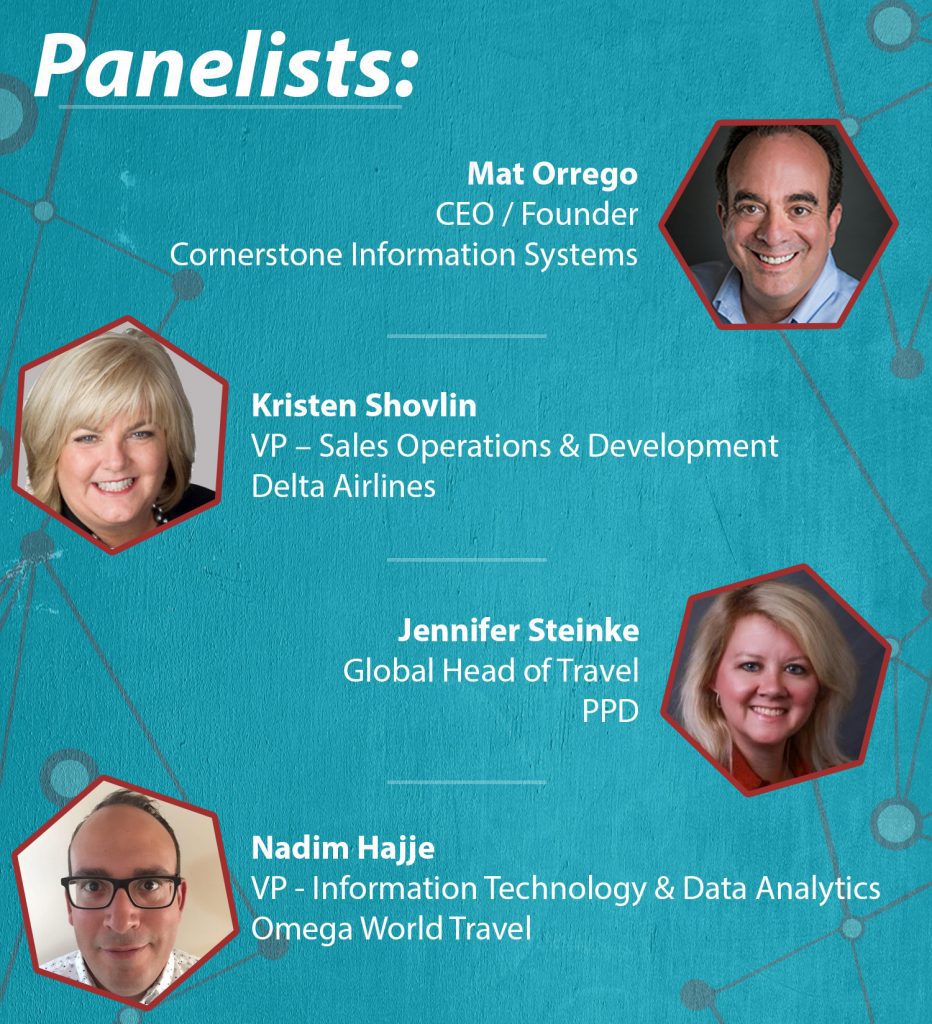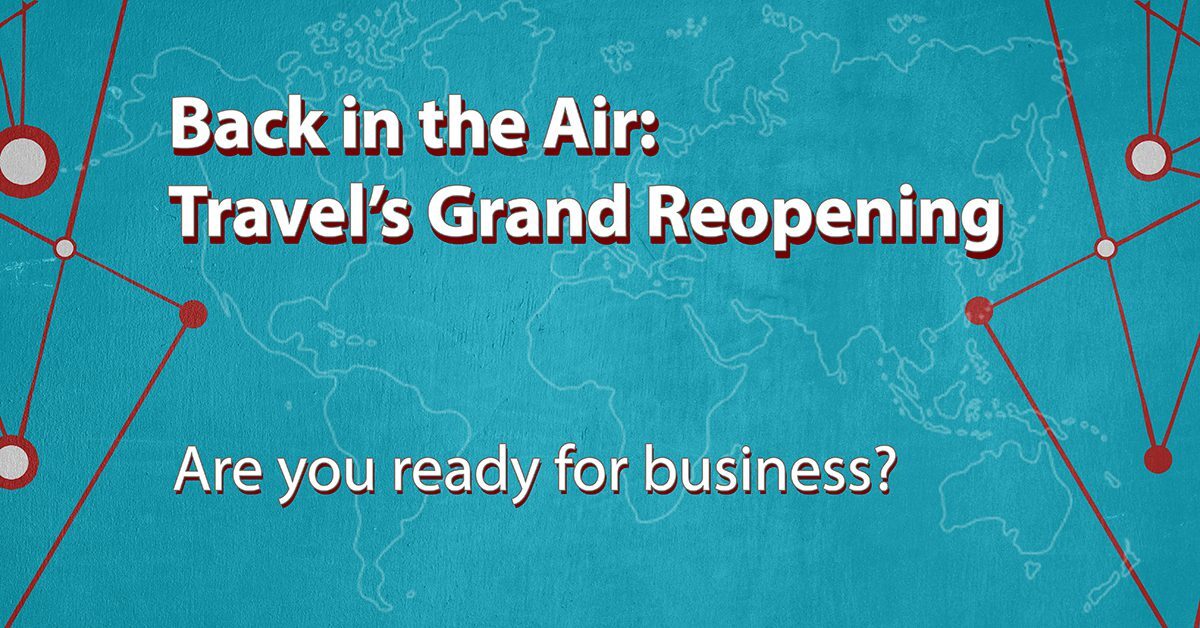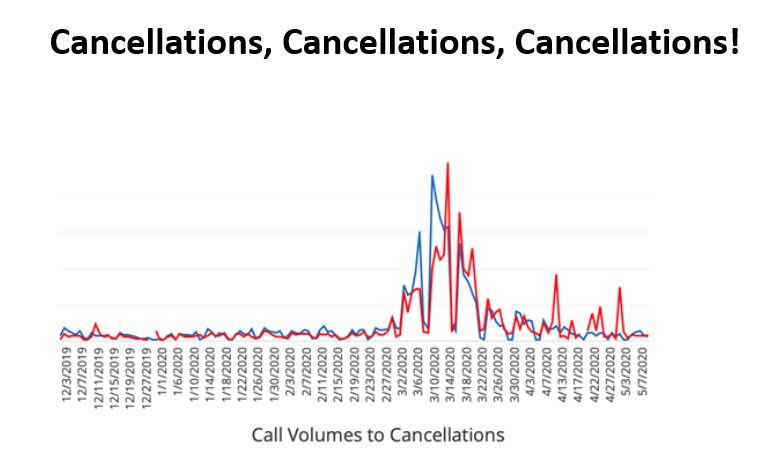- Managing our cancellations is going to be a huge hurdle (and advantage!) when it comes to “getting back to normal”.
- Knowing where all of your bookings are & managing your leakage is a Front-And-Center-Topic for our industry going forward.
- Traveler and corporate confidence will be the key to a quick return … lack of confidence will drag this out.
Find out what we’ve learned (and how to apply that knowledge) below…
Travel’s Grand Reopening: “Are You Ready For Business?”
Cornerstone Information Systems was thrilled to host a webinar regarding the reopening of travel in the pandemic world that we all face. Here are our takeaways.
Notice we did not say “post-COVID”. The post-COVID world is still a long way off, and in order to survive as an industry, we need to prepare and settle down for the long stretch of recovery to take place here and now. The world is still being affected by this pandemic and will continue to be so for the foreseeable future. It is a fluid and precarious unknown environment, but we are all finding out that in order to survive, we must navigate it – not just wait for it to pass.
The Situation As We Know It
“I never would have expected in my 32 years in this industry to ever be facing something like this. It’s new for all of us. What’s interesting is that we complain sometimes about how fragmented this industry can be, and about how many different silos are out there and how many different players there are. But in crisis, we really came together and that shows.” – Mat Orrego | Cornerstone Founder & CEO
While our industry was already facing a unique set of challenges before this hit, we all have to recognize that the last few months have really forced us to face some existential threats directly to life as we know it. We have never seen an event shut down the entire global economy before, and travel is taking the brunt of these changes. An Oxford economics study was done recently showing an expected 45% decrease of revenues for the entire year, and an 81% drop in April and May just so far.
But despite this doom and gloom, people are still traveling and we’re still seeing PNRs come through. There is also a bit of optimism around the fact that this situation might alleviate quicker than traditional types of economic depressions. Given those facts, we believe there is an opportunity here. But that opportunity starts with travel starting to return.
What Happened?
Many thanks to Omega Travel for furnishing this data regarding cancellations. Immediately as the situation began to ramp up, we saw cancellations — a lot of them. And for good reason! Borders were closing, countries were being declared “hot spots” and “high risk travel zones”. Conferences were being cancelled, and so were all the flights for their attendants. High profile meetings were being moved online. Trips were cut short, so return flights were cancelled in favor of immediate ones headed home.
This was an enormous and immediate challenge. Cornerstone published another article here called “Data: The Catalyst For Corporate Travel’s Recovery” that dives deeper into the subjects of “what went wrong” and “what went right”. Cancellations are an important topic to discuss in that light. But in looking ahead, we can simply note that they existed, and were handled with an expediency and cooperation between industry businesses that exceeded expectations.
A Cornerstone hosted industry-wide survey also broke down cancellations and found some companies reporting more than 25 events or meetings being cancelled for the rest of the year:
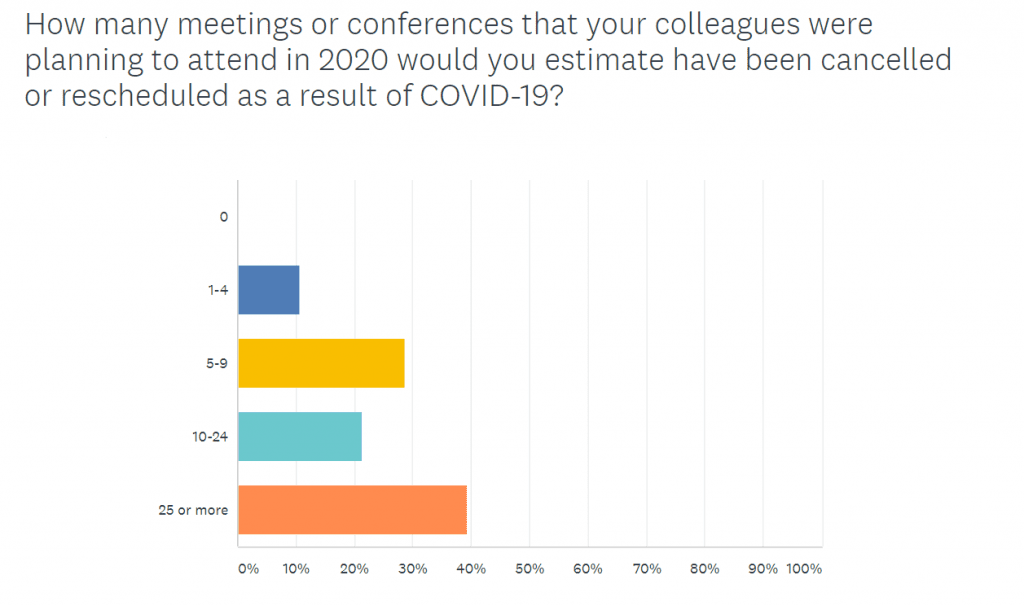
So where are we right now, and were do we need to “come back from”? The cancellations are the key. As travel ground to a halt, our aftermath is twofold:
- Mountains of confused data from the cancellations that need to be sorted out and tracked
- No trips being booked to replace all of that traffic.
Fixing both of these challenges is going to be key in returning travel to “normal”.
The Repercussions of the Pandemic
Perhaps the most obvious repercussion has been financial. Navigating the waters of loans, banks, Acts of Congress, staff reductions, salary reductions – it’s all been far more than what we expected when we turned the calendar page to 2020 this year. But there has been more than just balancing the ledgers.
- Staff reductions mean that we need to come to terms with the fact that we are going to look different once this passes. Some companies will acquire others. A few big players may have to be smaller businesses in order to survive. And yet others may grow due to the immediate direction change of the industry.
- Processing cancellation and refunds is also an immediate financial concern be it for travel tickets, hotel stays, or conference exhibitions. Decisions are being made every day as to whether refund policies will remain ridged or be relaxed. Ticket exchange policies and cancellation policies are also under scrutiny. While we expect many of these policies to go “back to normal” once this passes, many others may not. And if COVID remains in our lives longer than a year, more and more temporary changes will become permanent.
Practical repercussions are also rife in all of our systems right now. Getting travelers back to where they needed to be was the immediate concern of course, and we all accomplished that together. But now, we are left with a myriad of questions and mountains of records.
- Unused Tickets are going to be a major concern going forward. How will travelers get value from these (or get value back from these). Besides the concern over refunds and exchanges, the sheer volume of unused tickets and the issue of tracking them is absolutely an immediate concern to solve. (Consequently, Cornerstone has been updating our TicketTRAK software to help deal with exactly this issue).
- Health and Safety Concerns are paramount to address right now. Travelers will not get back on the road unless they are assured of their safety. Airlines, hotels, trains, car rentals, and everyone else that represent a point of physical contact for a traveler needs to be able to relate the same message: “we are safe, and our facilities are sanitary”.
- Airtravel Sanitation Concerns are especially at the forefront of traveler’s minds when it comes to the aforementioned health and safety issues. Likely, we will see more and more airlines take on policies like that of Delta Airlines – blocking middle seats and capping capacity on flights.
- Virtualization of the Workspace is going to be perhaps the longest lasting repercussion. How many face-to-face meetings have we all realized in the past few months could be conducted online? How many expensive business trips have companies realized they could save money on by holding a virtual meeting instead? And while many of us are eager to get back on the road and see our clients in person and close deals in distant board rooms … there is absolutely going to be a contingent that will not follow suit. Facebook and Twitter have both led the way by making work from home a “permanent option” for their employees. Those that follow suit will be contributing to the lack of business travel going forward, and that is simply a new way of life that we will have to navigate.
What Comes Next?
Despite everything, reservations are still being booked. We might have seen massive drops in travel, but it did not halt altogether. The main measure that we are using to predict is confidence. For that, we’ve deployed industry wide surveys. The following graphs are courtesy of Omega Travel, but they reflect the trends that we at Cornerstone have been seeing as well:
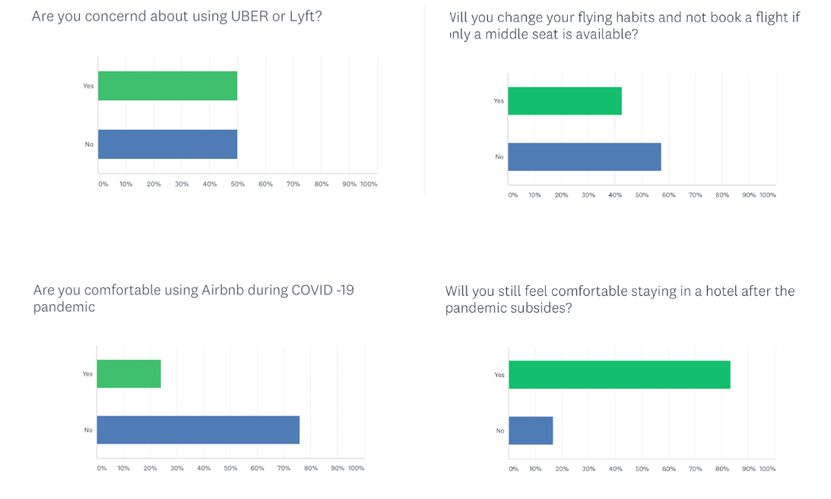
Omega Survey Takeaways:
- Confidence in travelers is going to be awarded first and foremost to big companies and chains than to smaller travel businesses and space sharing companies.
- Trust is being placed in airlines to maintain sanitation. Less than half of respondents said they would change their flights if only middle seats were available.
- People seem evenly divided over whether or not to trust ride-shares like Uber and Lyft, but that division disappears when asked about hotel alternatives like AirBnB.
- Far more travelers will prefer hotels over AirBnB alternatives. This is such a pervasive feeling that companies who did not have a policy on the matter are now restricting their travelers to preferred hotel chains and not leaving anything to chance.
Cornerstone surveys also found the following:

- The majority of respondents predicted that they would begin traveling again between 2 and 6 months, though some answered that it would be closer to a full year before they felt comfortable traveling again.
- Respondents estimated roughly 54% of future business (that would otherwise have been conducted with travel) will be conducted virtually instead for at least the rest of the year.
Predicting The Future of Travel
One point that was made clear in all surveys and all discussions is that domestic travel will pick up before international travel. The speed at which it picks up will have to do with traveler confidence in their safety as provided by the travel suppliers.
Travel suppliers are doing everything possible to educate the traveling public about sanitation procedures, and policies are being put in place to take those procedures even further.
It can also be surmised that the lack of traveler confidence in such companies as AirBnB will bode well for hotels. With people needing to travel on essential business first, and other business as confidence grows, hotels may gain back some of the business that space sharing companies had taken from them in the recent years. If a hotel can weather this storm, the other side looks particularly sunny.
The rise in people driving themselves on trips (thus avoiding both flights and ride-shares or car rentals) is also not a trend that will likely die out quickly. While the convenience of flying for long distances is not going to fade, people are already opting to drive themselves on shorter trips and may continue to do so until that confidence rises.
The quicker suppliers can instill an aura of safety and instill confidence in both travelers as well as liability-minded companies and TMCs, the faster the industry as a whole will rebound. But that is going to take more than just great messaging – it’s going to take real data, and smart data management.
If you would like to learn more about how you can better prepare for the COVID world of travel, schedule a demo with Cornerstone’s automation experts today.
Many thanks to those involved in the discussion! Click here if you would like to watch the recording of our webinar: “Back in the Air: Travel’s Grand Reopening”.
